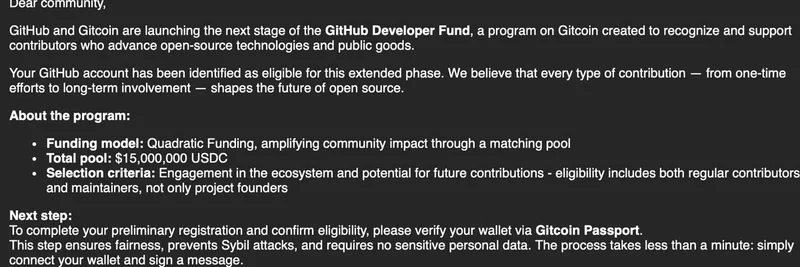If you're an open source developer, especially in the blockchain space, you've probably received emails from GitHub about issues or notifications. But recently, a sneaky phishing scam has been making the rounds, disguised as a legitimate grant opportunity from GitHub and Gitcoin. Let's break down what's happening based on a viral thread from security researcher @m4rio_eth, and how you can protect yourself.
The Scam Unveiled
It all starts with what looks like an official GitHub notification. A bot account, pretending to be from "gitcoin-foundationdao," creates an issue in your repository announcing eligibility for the "GitHub x Gitcoin Developer Fund 2025." The message talks about quadratic funding, a matching pool of $15,000,000 USD, and invites you to verify your wallet via Gitcoin Passport. Sounds legit, right? After all, Gitcoin is a real platform that funds open source projects in web3.
But here's the red flag: the link provided—something like grants.github.com/Apply-form—actually redirects to a fake site, "github-fundation.com" (notice the misspelling: "fundation" instead of "foundation"). Once there, it prompts you to connect your crypto wallet, which is a classic phishing tactic to steal your funds or private keys.
@m4rio_eth, the lead security researcher at Cantina and creator of Soldeer (the first Solidity package manager for Ethereum smart contracts), spotted this because he was targeted due to his work on Soldeer. He shared screenshots of the fake email, the bogus GitHub account, and the phishing site to warn the community.
In the thread, he explains how the scammers have created over 500 fake issues across various repos, making the emails seem authentic since they come directly from GitHub's system. The fake bot account was freshly made, another telltale sign of fraud.
How the Attack Works
- Fake Issues Creation: Scammers set up a GitHub account and spam issues with grant notifications.
- Legit-Looking Emails: Since it's a real GitHub interaction, the email arrives from [email protected], bypassing spam filters.
- Phishing Redirect: The embedded link leads to a counterfeit site mimicking official GitHub or Gitcoin pages.
- Wallet Connection: Victims are asked to connect their wallet for "verification," leading to potential fund drainage.
This isn't just random—it's targeted at active open source contributors, especially those in blockchain like Solidity devs working on tools for meme tokens or DeFi projects. If you're building on Ethereum or Solana, you're in the crosshairs.
Community Response and Updates
@m4rio_eth didn't stop at warning—he took action by mass-commenting on the fake issues to alert others, risking a GitHub ban in the process. He replied to 500 issues, saying things like "This is a scam!" to prevent more victims. Thankfully, replies from others in the thread confirm they avoided clicking thanks to his heads-up.
One user mentioned getting the email but ignoring it, while another pointed out similar scams using Lido for phishing. It's a reminder that web3 scams evolve quickly, often leveraging trusted names like Gitcoin, which genuinely supports public goods funding through quadratic models.
How to Stay Safe
In the wild world of blockchain and open source, vigilance is key. Here's what you can do:
- Verify Links Manually: Always type URLs directly instead of clicking. Check for misspellings like "fundation" vs. "foundation."
- Use Official Channels: Real Gitcoin grants are announced on gitcoin.co or official GitHub pages. Never connect your wallet unless you're 100% sure.
- Enable 2FA and Hardware Wallets: For extra security, especially if you're handling meme tokens or other crypto assets.
- Report Suspicious Activity: Tag @github on X or report issues directly on their platform.
- Educate Your Team: If you're part of a dev community, share this thread to spread awareness.
This scam highlights the intersection of open source and web3 vulnerabilities. Tools like Soldeer make building meme tokens easier, but they also attract bad actors. By staying informed, we can keep the ecosystem secure.
If you've encountered similar scams or have tips, drop them in the comments below. For more on blockchain security and meme token insights, stick around on Meme Insider.


